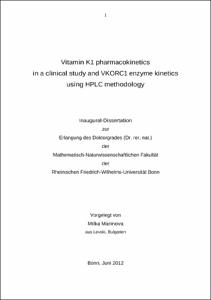Marinova, Milka: Vitamin K1 pharmacokinetics in a clinical study and VKORC1 enzyme kinetics using HPLC methodology. - Bonn, 2013. - Dissertation, Rheinische Friedrich-Wilhelms-Universität Bonn.
Online-Ausgabe in bonndoc: https://nbn-resolving.org/urn:nbn:de:hbz:5n-31713
Online-Ausgabe in bonndoc: https://nbn-resolving.org/urn:nbn:de:hbz:5n-31713
@phdthesis{handle:20.500.11811/5657,
urn: https://nbn-resolving.org/urn:nbn:de:hbz:5n-31713,
author = {{Milka Marinova}},
title = {Vitamin K1 pharmacokinetics in a clinical study and VKORC1 enzyme kinetics using HPLC methodology},
school = {Rheinische Friedrich-Wilhelms-Universität Bonn},
year = 2013,
month = apr,
note = {The main objective of the present work by means of a phase I clinical study was to determine inter-individual variance in pharmacokinetics of intravenous and oral phylloquinone (vitamin K1) mixed micelles formulation in humans as well as to explore a possible effect of the VKORC1 promoter polymorphism c.-1639 G>A on the metabolism of phylloquinone. The pharmacokinetics of phylloquinone mixed micelles formulation (Konakion® MM 2 mg) were evaluated, in healthy human adult volunteers (n=30; 15 m, 15 f) using an open phase I design protocol upon oral and intravenous administration. The probands were subjected equally distributed (n=10; 5 m, 5 f) to three genotype-specific groups regarding VKORC1 promoter polymorphism c.-1639 G>A (GG, AG and AA) to explore their relationship to specific pharmacokinetic parameters. Phylloquinone serum levels were determined by reversed phase HPLC with fluorometric detection after post-column zinc reduction. The method proved to be highly accurate, robust and reliable and showed a limit of detection and quantification of 0.015 ng mL-1 and 0.15 ng mL-1, respectively. Measured phylloquinone serum concentrations were subjected to pharmacokinetic evaluation using a non-compartment analysis. Pharmacokinetic analysis of serum phylloquinone concentration versus time profiles revealed significant differences in main pharmacokinetic parameters. Significant inter-individual pharmacokinetic variance of vitamin K fate in the human body could be indicated. Further, an influence of the VKORC1 promoter polymorphism c.-1639 G>A on the pharmacokinetic properties of phylloquinone in humans was shown. Significant differences in main pharmacokinetic parameters such as bioavailability and terminal half-life between groups suggest corresponding differences in processing of vitamin K in the human body. The relevance of polymorphisms in CYP4F2 and ABCC6 in this regard must be further elucidated in an enlarged sampling. The clinical importance of potential genetic determinants of vitamin K status should be further investigated with respect to effects on absorption, distribution, metabolism and elimination of vitamin K. Furthermore, the enzymatic characteristics of the VKORC1 were examined by studying its enzyme kinetics. Comparing vitamin K1 and K2 as substrates and their apparent kinetic constants Km and Vmax, the binding affinity of vitamin K2 epoxide to the VKORC1 appears to be higher while vitamin K1 epoxide seems to bind in a weaker manner to the enzyme.},
url = {https://hdl.handle.net/20.500.11811/5657}
}
urn: https://nbn-resolving.org/urn:nbn:de:hbz:5n-31713,
author = {{Milka Marinova}},
title = {Vitamin K1 pharmacokinetics in a clinical study and VKORC1 enzyme kinetics using HPLC methodology},
school = {Rheinische Friedrich-Wilhelms-Universität Bonn},
year = 2013,
month = apr,
note = {The main objective of the present work by means of a phase I clinical study was to determine inter-individual variance in pharmacokinetics of intravenous and oral phylloquinone (vitamin K1) mixed micelles formulation in humans as well as to explore a possible effect of the VKORC1 promoter polymorphism c.-1639 G>A on the metabolism of phylloquinone. The pharmacokinetics of phylloquinone mixed micelles formulation (Konakion® MM 2 mg) were evaluated, in healthy human adult volunteers (n=30; 15 m, 15 f) using an open phase I design protocol upon oral and intravenous administration. The probands were subjected equally distributed (n=10; 5 m, 5 f) to three genotype-specific groups regarding VKORC1 promoter polymorphism c.-1639 G>A (GG, AG and AA) to explore their relationship to specific pharmacokinetic parameters. Phylloquinone serum levels were determined by reversed phase HPLC with fluorometric detection after post-column zinc reduction. The method proved to be highly accurate, robust and reliable and showed a limit of detection and quantification of 0.015 ng mL-1 and 0.15 ng mL-1, respectively. Measured phylloquinone serum concentrations were subjected to pharmacokinetic evaluation using a non-compartment analysis. Pharmacokinetic analysis of serum phylloquinone concentration versus time profiles revealed significant differences in main pharmacokinetic parameters. Significant inter-individual pharmacokinetic variance of vitamin K fate in the human body could be indicated. Further, an influence of the VKORC1 promoter polymorphism c.-1639 G>A on the pharmacokinetic properties of phylloquinone in humans was shown. Significant differences in main pharmacokinetic parameters such as bioavailability and terminal half-life between groups suggest corresponding differences in processing of vitamin K in the human body. The relevance of polymorphisms in CYP4F2 and ABCC6 in this regard must be further elucidated in an enlarged sampling. The clinical importance of potential genetic determinants of vitamin K status should be further investigated with respect to effects on absorption, distribution, metabolism and elimination of vitamin K. Furthermore, the enzymatic characteristics of the VKORC1 were examined by studying its enzyme kinetics. Comparing vitamin K1 and K2 as substrates and their apparent kinetic constants Km and Vmax, the binding affinity of vitamin K2 epoxide to the VKORC1 appears to be higher while vitamin K1 epoxide seems to bind in a weaker manner to the enzyme.},
url = {https://hdl.handle.net/20.500.11811/5657}
}






